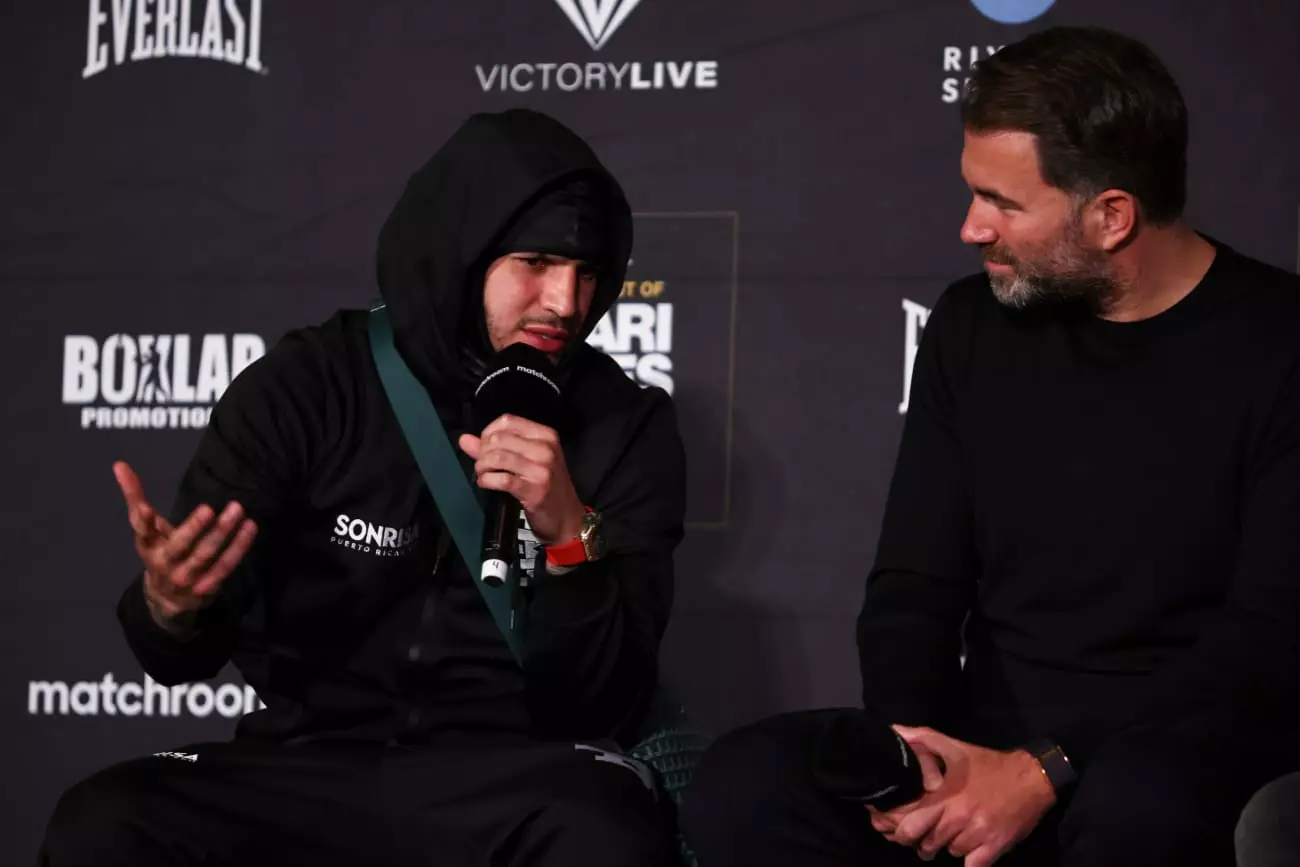Edgar Berlanga, an emerging name in boxing, has recently set the proverbial stage alight by blaming his promoter, Eddie Hearn, for not facilitating a crucial bout against IBF super middleweight champion, William Scull. In his vocal frustration, Berlanga casts himself as the fighter who sees the broader picture of opportunity while positioning Hearn as more of a stumbling block than a strategic partner. This situation reflects not just personal grievances but also speaks to the often complicated dynamics between fighters and their promoters. Berlanga’s declarations reflect a deep-seated desire for autonomy in a sport where contractual obligations can dim individual aspirations.
His contention that Hearn has treated him more like a subordinate than a collaborator suggests an underlying issue in boxing: the power struggle between fighters and promoters. Berlanga sees himself not merely as an athlete in need of guidance but as a self-contained entity—a “boss” in his own right—capable of orchestrating his career without being subjugated by promotional interests. For Berlanga, securing a fight with Scull and the supposed pathway it would create toward a quick rematch with Canelo Alvarez represents a missed opportunity that Hearn has squandered. This assertion, while bold, lapses into a realm of overconfidence that may not be entirely justified.
Financial Motivations and Paulbearers of Contention
Berlanga’s deep-seated yearning for another payday akin to his $10 million duel with Canelo is palpable. There’s a certain irony in his fight to be recognized as a formidable contender while simultaneously relying heavily on the financial allure of high-profile matchups. It’s this complex blend of ambition and financial desperation that renders his statements on the surface compelling but inherently problematic.
His upcoming fight against Jonathan Gonzalez-Ortiz may seem like a stepping stone, but to Berlanga, it symbolizes more than just a match; it’s a crucible. He uses this event to underscore his broader aspirations yet again, suggesting that a display of dominance here could lead to bigger opportunities against the likes of Caleb Plant and Jaime Munguia. This reliance on past accomplishments to justify future opportunities, especially in the unpredictable world of boxing, is questionable. History tells us that potential alone does not grant access to marquee matchups, as Berlanga risks alienating key stakeholders in this evolving sport.
The Illusion of Control
Berlanga’s self-portrayal as a ‘boss’ ironically underscores a common trap in professional sports: the delusion of control. Although he proclaims his desire to step outside the boundaries set by his promoter, he seems to neglect the hard truths about the complexities of high-stakes negotiations. The notion that he could have compelled Hearn or DAZN to meet his demands suggests a naive perspective of promotional dynamics. Fighters typically possess considerable clout only when they can point to significant victories or titles; Berlanga, while boasting an impressive knockout ratio, lacks the championship status that creates leverage in such negotiations.
A central element of Berlanga’s narrative rests upon the belief that beating Scull would secure a title and invite Canelo back into the ring for a lucrative rematch. However, Canelo’s historical pattern of rematching fighters is enough to cast doubt on Berlanga’s straightforward interpretation of a future bout. Canelo’s history of walking away from fighters after decisively winning contests serves as a stark reminder that confidence in the ring does not always translate to expectations outside of it.
The Path Forward: A New Chapter?
Berlanga has invited other promoters and networks to reach out post-Matchroom, framing this declaration as a self-empowering step toward reclaiming agency in his career. While this bold stand resonates with ambition, it opens another line of inquiry concerning whether he can consistently exhibit the boxing acumen and profitability that will draw interest from these stakeholders. The transition from being a ‘hoped-for’ prospect to a legitimate draw requires not only resilience but also tactical intelligence when choosing opponents and promotions.
His criticisms of Hearn’s handling of his career may serve as a clarion call for increased agency among fighters, but they also risk presenting him as someone unwilling to adapt. Fighters need strategic partnerships, not just adversarial stances. Berlanga’s disdain for the conventional behind-the-scenes dynamics in boxing suggests that he might be overlooking fundamental aspects of teamwork that are crucial to navigating his career effectively.
Ultimately, Berlanga’s ambitions are inspiring, yet they traverse the fine line between realism and illusion. If he thrives in harnessing the lessons learned from this situation, perhaps he will emerge not just as a fighter but as a mogul within the sport—something he clearly dreams of being.


Leave a Reply